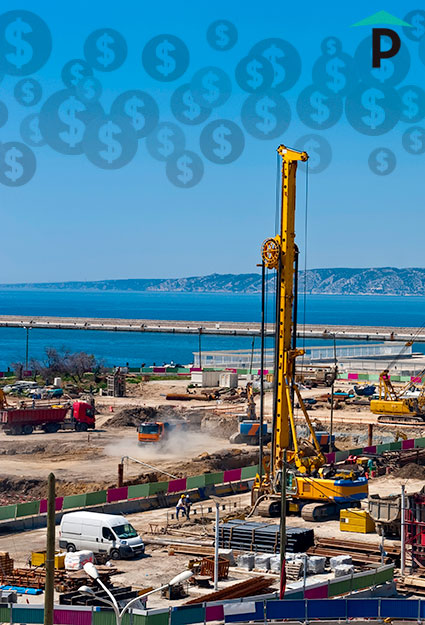Regardless of how elaborate or simple your planned construction works are, it’s vital that you seek out a performance bond agency to ensure that the job is guaranteed. However, understanding surety bonds and how they work can be tricky, especially if you’ve never had to consider them in the past. So to simplify things and explain what a performance bond agency does and the advantages of getting in touch with one, we’ve put together this article.
Call (844) 612-7238
What is a performance bond?
 Performance bonds, also known as a Contract Bond, are usually required on any construction-related project that carries significant value. Performance bonds are essentially legally-binding instruments where a bonding company guarantees that a contractor will be able to meet all the terms and conditions that are explained in their contract. In other words, if you have any kind of expensive construction-related project planned, you’re likely going to take out a performance bond to help ensure that the project is completed regardless of whatever setbacks the contractor faces.
Performance bonds, also known as a Contract Bond, are usually required on any construction-related project that carries significant value. Performance bonds are essentially legally-binding instruments where a bonding company guarantees that a contractor will be able to meet all the terms and conditions that are explained in their contract. In other words, if you have any kind of expensive construction-related project planned, you’re likely going to take out a performance bond to help ensure that the project is completed regardless of whatever setbacks the contractor faces.
A performance bond is usually required by law on any kind of public works project, but they are optional (though recommended) for private construction projects. In some cases, a contractor may require Performance bonds of their subcontractors to ensure that the work is completed should they need to rely on other contractors. This is generally a solid business practice if you are a general contractor, but this also means that the project owner has more guarantees and peace of mind.
In most cases, a performance bond helps to make a risky venture such as construction a much safer option for the project owner. Should a contractor ever fail their part of the project, the performance bond will help to ensure that the surety will take over and ensure that the project is completed regardless of the circumstances. The amount of liability under a performance bond will typically be determined for the case on an individual basis. It should also be noted that both the contractor and the surety are liable under the bond.
What is a bid bond?
A bid bond is a guarantee that the bidder will enter into a contract if they are awarded a job. These are often required of a contractor by the project owner and the bid bond stipulates that the contractor will also procure performance and payment bonds to support the contract and offer the project owner peace of mind to ensure the project will reach a satisfactory conclusion. In most cases, a bid bond penalty is around 10% of the estimated project value, but some municipalities will allow a 5% bid bond. For a federal construction project, the bid bond is issued at 20% of the contract’s overall value.
A bid bond should be treated as a form of security on construction and work projects. Should the contractor fail to enter the contract or be unable to provide the performance and payment bonds required, the project owner is entitled to claim rights against the bid bond.
Bid bonds are often carried out by a licensed surety insurance company that acts as a third party. However, not all bid bonds claims will lead to a bond payout. For instance, if a contractor files cash, certified check or money order, there is no third party intermediary that can review and mitigate a wrongful claim. In addition, posting cash causes an unnecessary encumbrance of a contractor’s cash resources.
What is a payment bond?
 A payment bond is often used in conjunction with a performance bond on any construction-related project. They are legally binding instruments (much like performance bonds) that guarantees that a contractor will pay all of the money due to subcontractors, laborers and material suppliers involved in the construction project. In some cases, they can be referred to as labor and material bonds. If the construction project is a public one, then payment bonds are required by law.
A payment bond is often used in conjunction with a performance bond on any construction-related project. They are legally binding instruments (much like performance bonds) that guarantees that a contractor will pay all of the money due to subcontractors, laborers and material suppliers involved in the construction project. In some cases, they can be referred to as labor and material bonds. If the construction project is a public one, then payment bonds are required by law.
A project owner will typically benefit from a payment bond because the subcontractors and suppliers involved will be paid so they can continue their work on your construction. However, subcontractors and suppliers will also benefit because they can continue to do their jobs and get paid. However, third-tier suppliers, laborers and contractors are not included in a payment bond and will not receive any benefits.
What is a subdivision bond?
Lastly, a subdivision bond aims to transfer the financial burden of finishing a land improvement project from a public entity to the property owner or developer. Once the project is finished, the ownership of the land or property is given back to the public entity. Examples of these projects can include street improvements, paving, sidewalks and storm drain repairs. Subdivision bonds essentially provide financial assurance to public entities that are performing renovations or constructions. A subdivision bond amount is often calculated from the engineer’s estimate for the costs of improvements or a percentage.
Surety bonds and their importance
So to conclude, let’s take a look at a couple of important points to keep in mind when it comes to performance bonds, payment bonds and surety bonds in general.
- Performance bonds guarantee that a construction project will be completed
- Performance bonds make sure that suppliers and subcontractors will be paid even if the main contractor encounters an issue with the project
- Project owners will be relieved of any financial loss
- Reduce the chances of a contractor failing to uphold their deal
- Potentially lower the costs of a construction project due to competitive bids
Sureties have always played a huge role in the success of a construction project. No matter how big or small your construction project is, a surety will help ensure that your project is completed regardless of the circumstances. With a performance bond agency like Pinnacle at your back, you’ll find it easy to prequalify contractors and vet them before inviting them to take over your construction project. You’ll also have more peace of mind knowing that the surety will go the extra mile to ensure that your construction reaches a satisfactory conclusion.
Check out Pinnacle Surety on Social Media.
We know it isn’t easy keeping up with industry trends and information—that’s why we’re here to help!
In our effort to support our partner and client initiatives, Pinnacle’s official Social Media channels are now up and running to provide company news, articles, blog updates, insider tips and thoughtful discussion!
We hope you’ll join us by giving Pinnacle a Follow on our Facebook and Twitter accounts and chiming in on the conversation! Have any questions, comments or concerns? Send us a PM on Facebook or give us Tweet at @PinnacleSurety.


